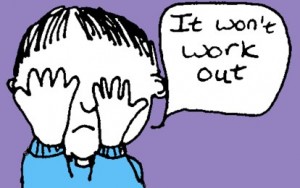“I have this brilliant new idea! I believe it could change the way we live our lives, revolutionize the order of the society, make lives better!” popped a thought in my mind, “This just wouldn’t make lives better, people would be happier! This might be it! I could be famous, and probably rich! I will be respectable, honored all around the world! But it’s the good my idea will do for the world, for humanity that fascinates me more” We all might have had a similar thought to the one I had, but it was the fear of failure and embarrassment that probably kept us away from bringing it to reality, fulfilling our wishes, desires, dreams… Well with every great idea, there’s always that risk of failure associated.
 I have a friend, he really crushed on a girl, but feared approaching her, talking to her, expressing that to her… He was not shy, no, not at all, he just feared the risk of rejection. Another friend wished to be a member of the school’s student council, but the fear of the risk of rejection kept her away from applying for the post. “I just get too depressed,” she said, “if I am ever rejected.” She had given up, accepted defeat even before trying.
I have a friend, he really crushed on a girl, but feared approaching her, talking to her, expressing that to her… He was not shy, no, not at all, he just feared the risk of rejection. Another friend wished to be a member of the school’s student council, but the fear of the risk of rejection kept her away from applying for the post. “I just get too depressed,” she said, “if I am ever rejected.” She had given up, accepted defeat even before trying.
Successful are those people who had a vision or a dream, overlooked the risk of failure and strived on towards their goal and achieved it. We are indeed too risk conscious these days. It is probably a natural instinct, a defense mechanism that keeps us from things our subconscious mind presumes may be harmful for us; anything out of the ordinary. Steve Jobs, the co-founder of Apple Inc., founded the company is his parents’ garage. Years later he was fired from the company he created, but started NeXT, another computer company, because he just loved what he did, he had a passion for his work; the risk of failure that people fear was a bitter reality for him, yet he started fresh and eventually got back into and took Apple to the heights he had aimed for. He took risks, big risks, but in the end, it was all worth it.
Steve Jobs commented on this in his famous speech at the commencement at Stanford University, when he stated about getting fired from Apple:
“The heaviness of being successful was replaced by the lightness of being a beginner again, less sure about everything. It freed me to enter one of the most creative periods of my life.”
Assessing the risks before we do something grand is a really good and helpful idea. It gives us an insight into what might be at stake. But is the fear of the associated risks keeping us behind?
Children often say any and everything that comes to their minds, they never hesitate; they would ask questions or pass comments that might otherwise be considered inappropriate, indecent, improper, or even blasphemous by an adult. But does that bring about any harm to that child? No! Well, even I used to ask radical, spontaneous questions as a child, and adults sometimes had a hard time answering them, or choosing the right words to answer them in an appropriate manner. Children do this because they do not associate any risk of embarrassment, risk of being stereotyped, risk of being labeled by the society. That, probably, is one of the reason why children are able to get things done the way they want.
 Being risk conscious may be a good thing at times; before investing in something new, a business conducts adequate market research. That is really essential to take ‘calculated risks’, and is beneficial to the business in the long run. Here, being risk-conscious is a good idea, for putting a lot of money at stake might not be so fascinating to the stake holders, employees and for the market at large.
Being risk conscious may be a good thing at times; before investing in something new, a business conducts adequate market research. That is really essential to take ‘calculated risks’, and is beneficial to the business in the long run. Here, being risk-conscious is a good idea, for putting a lot of money at stake might not be so fascinating to the stake holders, employees and for the market at large.
It is a reality, the world today is quite risk conscious, but is this new to our times, or is it something that has been coming along from generation to generation?
Turning the pages of history text books, we do see examples of warriors and kings sometimes taking rash decisions, not taking into account any risk associated with their actions, and we see that sometimes action or inaction was based purely on the risk associated to the contrary. It has been observed that being risk conscious has had affected many of history’s important decisions, but is not the current generation’s risk consciousness just too exaggerated? Are we too risk-conscious these days?
At the level of the technological development of this era, risk calculation can also be a computable task, but that’s not what has made risk consciousness so exaggerated in the modern times, it is probably the fast paced life. We are indeed too risk conscious, but is if for the good or for the bad, that depends on how we make use of the risks we assume or calculate.
As Bill Cosby rightly said,
“In order to succeed, your desire for success should be greater than your fear of failure.”
I have had written this essay for my entry into the Commonwealth Essay Competition. The topic of the essay was the 5th amongst the topics of the senior category. I choose this topic amongst the 5 because of its relevancy to the modern times, and for this very reason I have published it here.

Leave a Reply